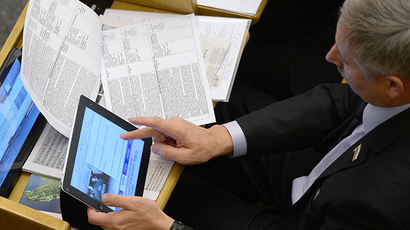Russian majority party MP urges colleagues to switch to English on social networks

An MP from the Lower House Committee for Information Policy has said that Russian lawmakers should maintain their social networks in English in order to debunk all distortions and lies spread by foreign propaganda.
“Russia has quite a few politicians and state officials who are registered on social networks, but they only write in Russian and only target a Russian-speaking audience. We need them to reach out to the world. This will not be difficult; they only have to register on social networks that are popular in certain countries and write there about what is going on in Russia,” MP Anton Gorelkin said in comments to RIA Novosti.
Gorelkin noted that his plan was feasible because the general public is gradually losing interest in conventional mass media and had started to turn to social networks and messengers for information and news. He also set US President Donald Trump as an example of a person who had mastered the new means of communication: “the whole world is now reading his tweets instantly and without any processing or distortion.”
“I am confident that public activity of our politicians on foreign social networks and in foreign languages would allow us to overcome all the distorted and deliberately scary stories about Russia that are now being imposed on Americans and Europeans by the biased local mass media. This would be a decent patriotic reaction to attempts to smear dirt on our great nation,” the lawmaker concluded.
In mid-2016 Russia introduced a law that obliges all civil servants and candidates for posts in state agencies to present detailed reports about their activity on social networks, blogs and even internet forums and chats. Working civil servants have to submit all information from the past year, while those who apply for places in state agencies must cover the last three years of their internet activity.
The bill was drafted jointly by MPs representing the majority United Russia party and the nationalist opposition LDPR. Its sponsors have said that in their opinion the motion would mitigate corruption risks and enforce higher standards of professional ethics in Russian state institutions.













